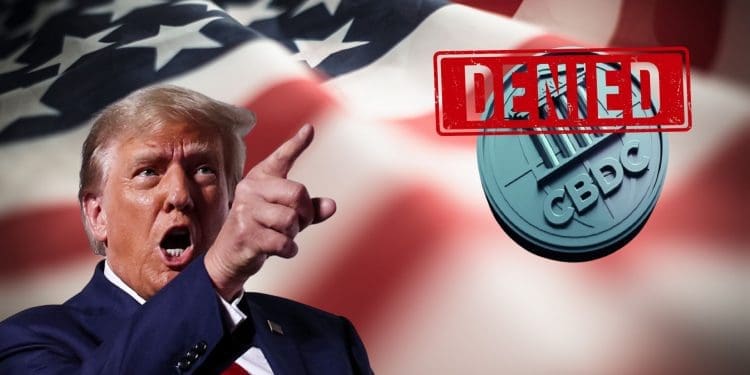- Donald Trump vows to never allow a CBDC if elected president again, warning it would give the government “absolute control” over citizens’ money and assets.
- The Federal Reserve is still researching CBDCs but has not decided whether to issue a digital dollar, with Chair Jerome Powell saying legislation would be needed.
- Other countries are much further along in developing CBDCs, with 9 already fully launched and over 100 exploring them, putting pressure on the U.S. to potentially follow suit.
Donald Trump, the former president of the United States, stated during a campaign speech in New Hampshire on Wednesday that he would never allow the issuance of a central bank digital currency (CBDC) if elected president again.
Trump Warns CBDC Could Give Government “Absolute Control” Over Money
In his speech, Trump warned that a federally-issued CBDC could grant the government dangerous levels of control over the financial system.
“Tonight I am also making another promise to protect Americans from government tyranny,” Trump said. “As your president, I will never allow the creation of a Central Bank Digital Currency. Such a currency would give the federal government, our federal government, absolute control over your money. They could take your money and you wouldn’t even know it was gone.”
According to Trump, a government-backed digital currency could enable federal authorities to monitor and seize citizens’ financial assets without oversight.
Federal Reserve Yet to Commit to CBDC Issuance
Trump’s remarks come as the Federal Reserve continues to research and weigh the possibility of one day issuing a digital dollar. However, Fed officials have not yet committed to minting such a currency.
Fed Chair Jerome Powell told Congress last year that the central bank would need explicit legislative approval from lawmakers before issuing a CBDC. He reiterated that the Fed has made no decision yet on whether to pursue a digital dollar.
Other nations more advanced in CBDC development
While the Fed studies the issue, other central banks around the world are much further along in developing CBDCs. According to the Atlantic Council’s CBDC tracker, over 100 countries are exploring a government digital currency.
Among them, nine countries have already fully launched a CBDC, including China, while many others are in advanced pilot stages. The European Central Bank also recently announced preparations to one day potentially issue a digital euro.
Conclusion
Trump’s vocal opposition to CBDCs illustrates the political controversies surrounding the issue in the U.S. For now, the Federal Reserve is treading cautiously and has not committed to minting a digital dollar. However, as other nations continue advancing their CBDC plans, pressure may mount on the Fed to follow suit. The debate over a potential digital dollar is likely to only intensify as the 2024 election approaches.














